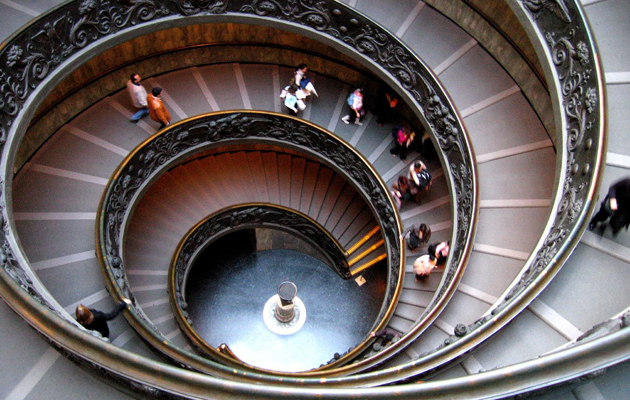If the presence of idols is so pervasive in the whole of human life, certainly they have a place in cities. Actually, cities are spatial and cultural spaces for idols to shape and destroy what comes under their dominion.
 Building in Rome. / MoreBCN, Flickr CC
Building in Rome. / MoreBCN, Flickr CC
Idolatry has become a theme of renewed interest in recent theological discussion. It neatly describes what the Bible warns against, and it helps to make sense of the overarching narrative of the Christian message. Idols are the enemies of God and try to replace God as the ultimate source of human life. Here is how Tim Keller identifies the essence of an idol in Augustinian terms: “If you love anything more than God, even though you believe in God, if there is anything in your life that is more important to your significance or security than God, then that is an idol – a kind of pseudo-god, a false god, a covenant master”.[1]
Idols are counterfeit gods that infiltrate personal lives and divert them from searching for God and following Him. It would be utterly simplistic to think of idols only operating in individuals or groups of people. If the presence of idols is so pervasive in the whole of human life, certainly they have a place in cities. Actually, cities are spatial and cultural spaces for idols to shape and destroy what comes under their dominion. Idolatry is therefore an “interpretative key” to come to terms with the spiritual condition of the city. Here I offer my homework as far as the city of Rome is concerned. This is a tentative sketch of what the idols of Rome look like. They are in chronological order, going back to the ancient past of Rome down to its present-day outlook. The idols do not replace one another, but they build on each other.
IDOL N. 1 PAX ROMANA (The Roman Peace)
From the second century BC until 476 AD, Rome dominated the ancient world. Its status quo was named pax romana, the Roman peace. Its goal was to have dominion over nations and to exercise political power. Through military conquest this “peace” was taken to the world. But it was hardly a real “peace” for anyone. It was actually based on the use of violence, the imposition of slavery and the oppression of dissenters. The Pax Romana is gone as a political system but its achievements in terms of architecture and ruins are famous throughout the world. Moreover, it influences the culture of the city by way of infusing a kind of spiritual arrogance and the illusion of being at the center of the world. The gospel brings another kind of peace: the shalom of God, the peace of God that gives dignity and reconciliation in Christ.
IDOL N. 2 PAPAL CATHOLICA (The Religious Stronghold)
As the Rome Empire faded away, the city was run until 1870 by the Roman Catholic Church with its highest institution, i.e. the Pope. Popes considered themselves to be the true inheritors of the emperors. Of course, they also brought some Christian elements, thus practicing a kind of assimilation between pagan and gospel motives. The main ideology that drove the city was still “imperial” and political at its very heart. The city grew full of magnificent religious buildings, wanting to show greatness and power. As far as the spiritual influence of the Papal “catholica” is concerned, the church has been running people’s lives for centuries, exercising political and economic power. The gospel that Rome needs to hear and see is instead a message based on God’s word alone (sola Scriptura), centered on Christ alone (solus Christus), grounded on grace alone (sola gratia).
IDOL N.3 THE PALAZZO (The Palazzo)
After the unification of Italy (1861), Rome became the capital of the Italian nation (1870). Following the Roman Empire and the Catholic Church, now the state ruled the city, adding another layer to its spiritual outlook. Rome is a city where political structures are far from transparent, and its standards of governance are far from just. A general shrewdness of spirit marks public life. Rome is a city of political maneuvering where things can be settled if you are “in” the right circle. As the gospel alternative, the church needs to be the place where a culture of responsibility is promoted, in personal life, family, society, politics, etc.
IDOL N. 4 LA DOLCE VITA (Sweet Life)
Finally, Rome is also famous for its “sweet life”, from the title of the movie by Federico Fellini La dolce vita (1960). Good food, easy life, a-moral pleasures, and sex without commitment – all contribute to the shape of the dream of a good life. Of course, there is much emptiness around and its promises are futile. Real life is different, yet the sweet life inspires people and nurtures their expectations. The gospel needs to match the aspiration of a good life, while denouncing the slippery slope of a life without Christ. After all, the Christian life means to glorify God and to enjoy Him forever.
The church needs to be aware of these idols, as well as to embody viable gospel alternatives. The gospel not only denounces the bankruptcy of idolatry, but also fills life with real meaning, love and hope.
*This text is an excerpt of my article “Identifying the Idols of the City” in Tim Keller, Center Church Europe. Doing Balanced, Gospel-Centered Ministry in Your City, Franeker: Uitgeverij Van Wijnen, 2014, pp. 168-174. The book can be bought here.)
Leonardo de Chirico is an Italian Evangelical pastor, theologian and Vatican expert.
[1] Timothy J. Keller, ‘Getting Out (Exodus 4)’, in: D.A. Carson (ed.), The Scriptures Testify About Me, Nottingham: IVP 2013, p. 41.

Las opiniones vertidas por nuestros colaboradores se realizan a nivel personal, pudiendo coincidir o no con la postura de la dirección de Protestante Digital.
Si quieres comentar o